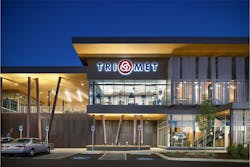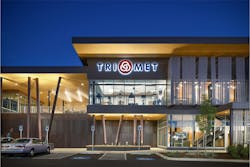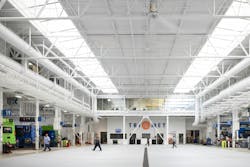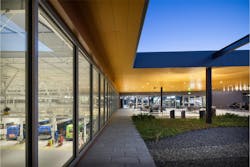TriMet’s Powell Garage leads way in modern transit facilities
TriMet’s Powell Garage was built in 1976 on Southeast Powell Boulevard in Portland, Ore., as a temporary facility while the Center Garage in southeast Portland was under construction. The temporary facility ended up lasting TriMet more than four decades.
In 2016, the agency began the process of building a new Powell Garage that would deliver a facility that was four times the size of the original. The decision to build a new garage was made by TriMet to accommodate charging infrastructure for future zero-emission buses, as well as provide a comfortable space for its bus operators and employees to work and operate.
Before beginning the construction process, TriMet went through a full Request for Proposals (RFP) process with designers and contractors for the project. TriMet originally chose a firm known as RNL Design for the design of the project. The firm was acquired by Stantec in 2017 and Stantec took over as lead designer.
For the construction contract, the agency selected JE Dunn Construction. Both companies would work hand-in-hand with TriMet throughout the duration of construction for the project, which began in 2018. The garage opened in late 2022.
“The construction of the garage was like that nine-piece puzzle where you're kind of moving the empty box around to make the picture,” described Katie MacKinnon-Kiser, TriMet’s project manager on the new Powell Garage.
The project would be completed in phases so TriMet could continue operation of the old Powell Garage while the new garage was being built. Phase 1 included a 24,000-square-foot fuel and wash building while Phase 2 more than doubled the original bus maintenance area.
When determining how big the new garage had to be, TriMet considered how many buses the agency could acquire with their staff levels and the size of the buses. The garage can hold anywhere from 300 to 346 zero-emission buses. Another consideration was building height with TriMet and its partners ensuring the garage was tall enough to accept lighter than air fuels.
MacKinnon-Kiser said both Stantec and JE Dunn Construction were easy to work with on the project.
“Stantec had worked on a lot of these facility-type projects in the past, so it was nice to have that veteran presence there,” MacKinnon-Kiser said. “They knew what we could and couldn’t do when it came to design. With JE Dunn, they had never worked for TriMet before, but we learned a lot from them because TriMet doesn’t build a lot of buildings, so we leaned on their experience, as well, that we will implement in other projects down the line.”
Barb Berastegui, a design principal with Stantec who worked with TriMet on the project, noted when the firm entered the garage project, it felt it could be exactly what the Portland-based agency was looking for when it came to a lead design partner.
“We really valued TriMet’s commitment to sustainability, to their community and our values at Stantec very closely aligned with theirs,” Berastegui noted. “We design a lot of facilities for buses, but we design them for the people who work in them because they're very important civic buildings. They bring a lot of value to the communities they serve and it's very important to create designs and iconic buildings that represent the sustainability and the people focused values that TriMet upholds.”
Jeff Byrne, JE Dunn Construction’s lead superintendent on the Powell Garage, noted some of the challenges during construction included dealing with the relocation of the 911 Fiber Line that is part of Portland’s 911 Call Center, explaining that the main fiberoptic utility feeding to the central hub ran directly through the TriMet site, passed up and over the existing building and out the east side of the property.
“The potential risk was disruption of emergency services for the entire Portland Metro area,” Byrne said. “Great care had to be taken to avoid disturbing this critical piece of infrastructure. The project team successfully relocated the fiber into an underground vault system and then continued to work around the fiber to perform work on mass excavation, foundations and underground utilities. Service was never interrupted and the integrity of the critical lifeline was maintained throughout the four-year life of the project.”
Along with Stantec and JE Dunn Construction providing design and contracting for the project, the Powell Garage project received a lot of support from Disadvantaged Business Enterprise firms.
“There’s not a lot of building vertical buildings,” MacKinnon-Kiser said. “When we were meeting with contractors about the project, we got a lot of questions, asking if the project was another light-rail extension and it’s like, ‘No, it’s a building’ so then the contractors told us they knew people, so we got a lot of exposure to a lot of different contractors and design consultants, which is good because we're going to do more and we can't just keep investing in the same companies and firms.”
The project had a more than 26 percent Certification Office for Business Inclusion and Diversity firm participation rate. MacKinnon-Kiser notes the percentage shows the commitment TriMet puts into supporting the local Portland community.
Our local contractors are doing good business. They're able to make money in a way that sustains not only some of their businesses, but also some people are able to grow from that,” MacKinnon-Kiser said.
Now that the project is completed, MacKinnon-Kiser said it has been rewarding to see TriMet employees use the facility and have a positive attitude while on the job.
“We have generations upon generations of drivers so I really feel like we were able to take some of their stories and give them a space that they could still identify with that being Powell Garage and their hub,” MacKinnon-Kiser noted. “The garage has a training room where there is a lot of hands-on learning for our mechanics and they have mock-up vignettes of the buses.”
About the Author
Brandon Lewis
Associate Editor
Brandon Lewis is a recent graduate of Kent State University with a bachelor’s degree in journalism. Lewis is a former freelance editorial assistant at Vehicle Service Pros in Endeavor Business Media’s Vehicle Repair Group. Lewis brings his knowledge of web managing, copyediting and SEO practices to Mass Transit Magazine as an associate editor. He is also a co-host of the Infrastructure Technology Podcast.




